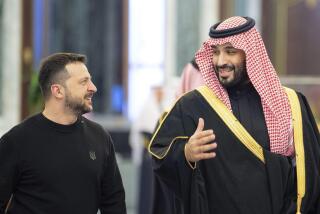Powell Questions Saudi Leaders on Arrest of Dissidents
- Share via
RIYADH, Saudi Arabia — Fresh from praising U.S. efforts to bring democratic freedoms to Iraq, Secretary of State Colin L. Powell flew to neighboring Saudi Arabia late Friday to question Saudi leaders on the recent detention of more than a dozen dissidents.
Saudi Arabia on Tuesday arrested more than a dozen writers, university professors and intellectuals who are critical of a government-run human rights commission, the country’s first.
In a three-hour visit, Powell met with Foreign Minister Prince Saud al Faisal and Crown Prince Abdullah, the country’s de facto ruler, to express the U.S. government’s concerns about the arrests, as well as discuss other issues such as Saudi-U.S. cooperation.
“We have concerns when people who are trying to express their views and do it in an open way and a democratic way are not able to do so,” Powell said, standing next to Saud in the glittering main hall of the military airport terminal. “We had a good, candid, open debate about this issue.”
Late Friday, Agence France-Presse reported that five men were still being held.
The arrests come as Saudi Arabia, where political parties are banned and freedom of speech is limited, undertakes a fitful reform effort. In October, Abdullah and other more moderate members of the aging royal family called for municipal elections. They have also pushed for liberalized trade laws and a crackdown on Islamic fundamentalist preachers.
At the same time, they have been cautious about moving too quickly to change the deeply conservative society. They say that democratization will take time, and they have frequently arrested dissidents for statements they have deemed too critical, or seized their passports and restricted travel.
Still, the reform movement has surged in the last year, with a loose group of reformists submitting several petitions calling for more freedoms. Several of those arrested Tuesday have long histories of dissent. One, Mohammed Said Tayeb, a lawyer in Jidda and longtime reform advocate, has been arrested six times since 1962.
“Now, reform is a popular demand,” he told The Times in August. “Everyone is talking about it -- men, women, friends, neighbors.”
Saud defended the detentions as he stood next to Powell, calling them an “internal matter.” He said that the reformers had been asked to come in for questioning and that most had been released. Those who remained in jail, he said, would be subject to “legal courts.”
He said that his kingdom is at a critical point in its battle against the Al Qaeda terrorist network, which is believed linked to bombings in Riyadh last year that claimed more than 50 lives.
“These people sought dissension when the whole country was looking for unity and a clear vision, especially at a time when it is facing a terrorist threat,” Saud said. “This is not the time to seek dissension.”
More to Read
Sign up for Essential California
The most important California stories and recommendations in your inbox every morning.
You may occasionally receive promotional content from the Los Angeles Times.










